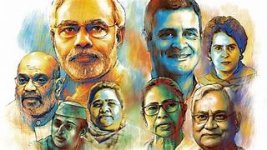In the world’s largest democracy, politics should be about people. But increasingly, Indian politics appears to be driven more by power than public welfare — raising serious questions about the future of democratic values in the country.
Just look around: political defections are rampant, regional leaders are rising and falling overnight, and issues that matter — like jobs, education, and healthcare — are often overshadowed by identity politics and media spectacles.
One doesn’t have to dig deep to see the shift. Instead of discussing unemployment or the rural economy, headlines are dominated by religious polarization, celebrity endorsements, and digital outrage wars. The rise of "soft dictatorship" — where democratic processes exist but are overshadowed by authoritarian tactics — is a concern political thinkers have been whispering about for years.
Criminals in politics remain a harsh reality. According to the Association for Democratic Reforms (ADR), over 40% of MPs in India have criminal cases against them.
Still, what India needs is more issue-based politics — debates on climate change, education reform, women’s safety, and economic justice. These are not "boring" topics — they’re the lifeblood of a functioning democracy.
But will our political parties ever move past identity, vote banks, and propaganda?
That’s the debate we need to have — not just on social media, but at the polling booth, in classrooms, and around dinner tables.
Just look around: political defections are rampant, regional leaders are rising and falling overnight, and issues that matter — like jobs, education, and healthcare — are often overshadowed by identity politics and media spectacles.
One doesn’t have to dig deep to see the shift. Instead of discussing unemployment or the rural economy, headlines are dominated by religious polarization, celebrity endorsements, and digital outrage wars. The rise of "soft dictatorship" — where democratic processes exist but are overshadowed by authoritarian tactics — is a concern political thinkers have been whispering about for years.
Where Did We Lose the Plot?
Many citizens, especially youth, are disengaged from traditional political discourse. They view politics as corrupt, dirty, and disconnected. And they’re not entirely wrong.Criminals in politics remain a harsh reality. According to the Association for Democratic Reforms (ADR), over 40% of MPs in India have criminal cases against them.
- Caste-based politics continues to dominate elections, even in urbanized states, raising questions about merit and inclusive representation.
- Dynastic politics hasn’t disappeared either — whether it’s Congress or regional parties, family names still trump merit.
Can We Reform from Within?
Despite the gloom, not all is lost. Young politicians, independent candidates, and digital activism are slowly changing the narrative. Movements like RTI, anti-corruption protests, and student-led agitations have shown that political change is still possible — but it’s hard-fought and often silenced.Still, what India needs is more issue-based politics — debates on climate change, education reform, women’s safety, and economic justice. These are not "boring" topics — they’re the lifeblood of a functioning democracy.
But will our political parties ever move past identity, vote banks, and propaganda?
That’s the debate we need to have — not just on social media, but at the polling booth, in classrooms, and around dinner tables.


